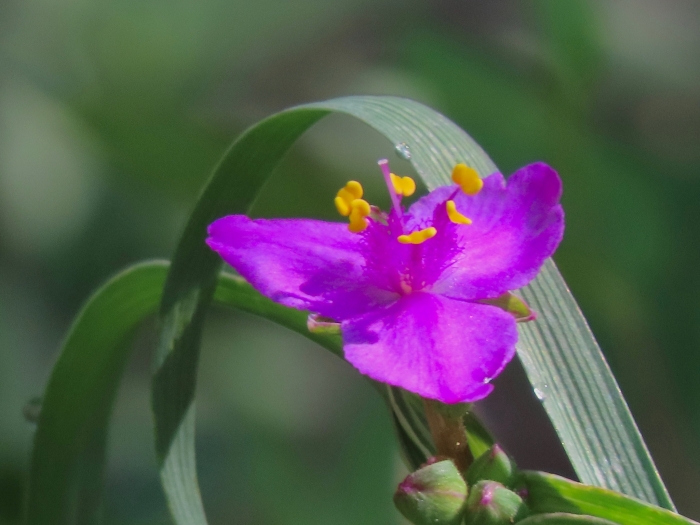Prairie Spiderwort
(Tradescantia occidentalis)
Prairie Spiderwort (Tradescantia occidentalis)
/
/

icosahedron
CC BY 4.0
Image By:
icosahedron
Recorded By:
Copyright:
CC BY 4.0
Copyright Notice:
Photo by: icosahedron | License Type: CC BY 4.0 | License URL: http://creativecommons.org/licenses/by/4.0/ | Rights Holder: icosahedron | Publisher: iNaturalist | Date Created: 2019-06-03T09:23:54-07:00 |






















































Estimated Native Range
Summary
Tradescantia occidentalis, commonly known as Prairie Spiderwort, is a deciduous perennial herb native to prairie and grassland ecosystems as well as open woodlands in the Southwestern and Central USA, extending into parts of Southern Canada. This species typically grows to a height of 12-18 inches (30-45 cm) and spreads to about the same width. Prairie Spiderwort has grass-like foliage and produces clusters of three-petaled, vivid blue to purple flowers from late spring to early summer, which are quite showy and attract pollinators. After flowering, it may produce small, capsule-like fruits.
Prairie Spiderwort is valued for its drought tolerance and its ability to thrive in poor soils, making it an excellent choice for naturalistic plantings, wildflower gardens, and restoration projects. It is also used in borders and as ground cover. This plant prefers full sun but can tolerate part shade, and while it is adaptable to various soil types, it performs best in well-drained soils. It requires moderate to low water once established. Prairie Spiderwort is relatively low-maintenance but can be susceptible to spider mites and aphids in dry conditions. It is not known for aggressive roots or significant disease problems. The unique radiation-sensing properties of its stamen hairs add an interesting scientific aspect to its cultivation.CC BY-SA 4.0
Prairie Spiderwort is valued for its drought tolerance and its ability to thrive in poor soils, making it an excellent choice for naturalistic plantings, wildflower gardens, and restoration projects. It is also used in borders and as ground cover. This plant prefers full sun but can tolerate part shade, and while it is adaptable to various soil types, it performs best in well-drained soils. It requires moderate to low water once established. Prairie Spiderwort is relatively low-maintenance but can be susceptible to spider mites and aphids in dry conditions. It is not known for aggressive roots or significant disease problems. The unique radiation-sensing properties of its stamen hairs add an interesting scientific aspect to its cultivation.CC BY-SA 4.0
Plant Description
- Plant Type: Herb
- Height: 1-2 feet
- Width: 1-2 feet
- Growth Rate: Moderate
- Flower Color: Blue, Pink, Purple
- Flowering Season: Summer
- Leaf Retention: Deciduous
Growth Requirements
- Sun: Full Sun, Part Shade
- Water: Medium
- Drainage: Fast
Common Uses
Bee Garden, Butterfly Garden, Deer Resistant, Drought Tolerant, Edible*Disclaimer: Easyscape's listed plant edibility is for informational use. Always verify the safety and proper identification of any plant before consumption., Low Maintenance, Rabbit Resistant, Showy Flowers
Natural Habitat
Native to prairie and grassland ecosystems as well as open woodlands
Other Names
Common Names: Spiderwort, Western Spiderwort, Tradescantie De L’Ouest, Tradescantie Occidentale
Scientific Names: , Tradescantia occidentalis, Tradescantia occidentalis var. typica, Tradescantia virginiana var. occidentalis,
GBIF Accepted Name: Tradescantia occidentalis (Britton) Smyth